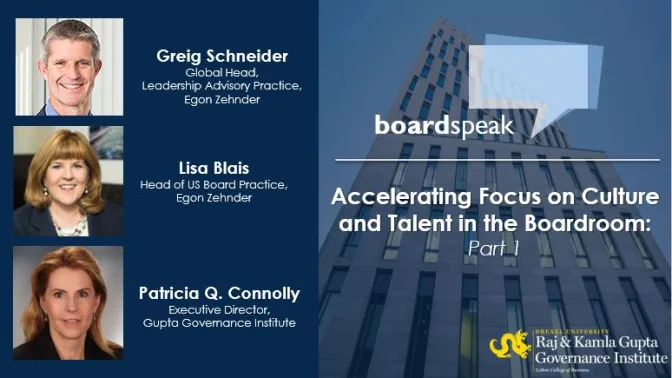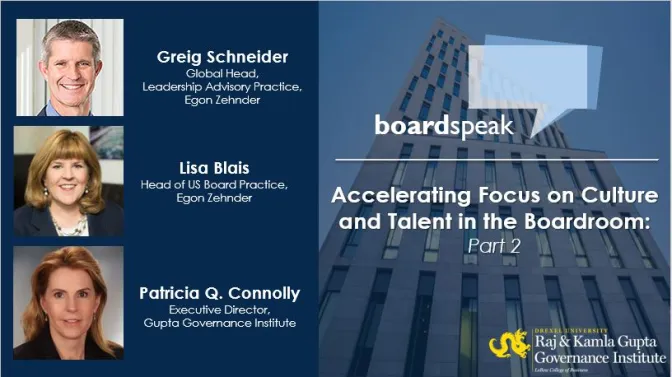The Early Arrival of the Future of Work: COVID-19's Impact and the Role for Boards
Listen to The Early Arrival of the Future of Work: COVID-19’s Impact and the Role for Boards
Alyssa Abbott:
Hi, my name is Alyssa Abbott and I am the Associate Director of the Gupta Governance Institute at Drexel University’s LeBow College of Business. Welcome back to Boardspeak, our thought leadership series. I am delighted to be joined today by Paula Loop, who is the Governance Insight Center Leader at PwC. I asked Paula to join me today for a brief high level conversation about the future of work, which is a timely topic right now for all of us, as well as the board’s oversight of how changes in work will affect a company’s recovery.
Paula, I appreciate you giving us your time today. Prior to the pandemic, boards and the C-suite were already having conversations about the future of work and how it was being shaped by things like artificial intelligence, automation, robotics, et cetera. In your work with boards, are you seeing an increased focus on this topic because of the pandemic as companies are preparing for recovery?
Paula Loop:
I would say that for several years, companies have been focusing on how emerging technologies are going to change the way that they do things. Technologies like AI automation and robotics that you mentioned are going to change the back office and the front office. It’s going to make companies more efficient and also help companies improve the quality of their product or their service that they provide. Digital transformations were taking hold in many industries, and this was certainly a topic in many boardrooms, but I think the companies that were farther along on that digital journey were able to more easily function in the early days of the pandemic. They were more comfortable with remote working, they were able to leverage automation or robotics, et cetera. For those that weren’t as far along, the pandemic was a bit of a wake-up call. Humans were severely affected by the virus, but the more automated your operations are, the less you had to rely on humans, the less you needed to worry about employee safety and so forth. I think the pandemic is accelerating the focus on digital transformations. Some companies are just continuing on the path that they were already on and others are probably hurrying to catch up.
Abbott:
I think that’s a good point. The thought process behind this digital transformation over the last few years was the companies that get it right will be best positioned going forward. I think, to your point, that has just been heightened by the pandemic. The ones that were further along, like you said, were able to navigate the unexpected disruption much easier than their peers. Have you seen the conversation lately expand past technologies and digital transformation, including things like workforce dynamics, flexible schedules, health and safety, and other kinds of future of work topics?
Loop:
Absolutely, almost all the way back to April, which seems like forever ago right now, companies and boards started exploring the concept of returning to the workplace. Hopefully, companies were still able to work, but returning to the workplace was starting to mean different things for different companies and different types of workers. If you remember, we saw healthcare, frontline workers, and manufacturing, as the first groups to get this sorted out. Office workers and admin are in the last group, and companies have had a long time to think through safety issues and figure out what they are going to do to bring these workers back into the workplace. Many companies are still not back, and the safety hurdles, in some cases, are too hard to achieve or too expensive when they consider the risk and the reward.
The majority of office workers in large cities are still working remotely, and we have been for the last five months. As an example, for PWC, we have a 35 story office building in New York city and we’re still struggling with how we get people in and out of elevators, and how can you possibly have people in a conference room when you’re only supposed to be in there for an hour at a time, then you have to clean it?
There are so many hoops that you must go through. I think many companies have already announced that they are planning for most of their workforce to work remotely until January of 2021, and some have even already said June of 2021. The ones that had to figure it out for workers that had to be there, did. However, those that have been chugging along remotely and working well, are still kind of in a “wait and see” mode.
Abbott:
I think that it might unfold a little slower than we had anticipated. We were just on a call yesterday with a CEO who was saying a lot of peer companies are looking at the cost savings of moving to a totally remote workforce, in terms of real estate and other expenses. But, have we realized fully the negative implications of a totally remote workforce for extended periods of time? In terms of working with developing talent, instilling a sense of culture into a company when everyone’s spread out, and can’t be in a conference room, or in an elevator together?
Loop:
I definitely think there’s so many issues at play here. When I think about things that boards are discussing now on this topic or things that management is thinking about, I would say that COVID-19 has really allowed us to think differently about things we’ve been doing for a long time and re-imagining what is possible. I think that companies that can do that are the ones that are going to emerge stronger than others, and that includes thinking about the way we work. It’s a chance to consider whether or not there’s groups of workers that can work remotely permanently. This may be a win for some employees, less commute time, less travel time. It could be a win for the company, less real estate costs, they have the ability to attract talent from all over the country. Maybe, the best resources that they need are located in upstate New York or in Maine, and don’t have the ability or the desire to go into an urban setting. I’m seeing companies step back and run through all their job categories and take a fresh look at each category of their workforce and apply a new lens. Their thinking is: is this really a role where employees need to be in the office every day, or maybe just occasionally, or maybe just rarely?
Also, all companies that I know have really put most of their significant real estate decisions on hold. Decisions can only be put off for so long, but they still are trying to figure out how to reconfigure the workspace so that it would work for periodic visits maybe to the office versus full time occupancy by all employees. We don’t know exactly what is going to happen next with the pandemic, so companies
are trying to be cautious, but recognize that they do still need to move forward. Circling back, I think in the board’s role, I would ask management: have we really rethought our employees work, can more jobs be done remotely, potentially permanently?
Are there some employees who don’t need to be in the office, or only need to be in the office a few days a week? Do employees that travel a lot that do sales or internal audit or consultants really need to travel on a regular basis? Maybe they can travel a little bit more episodically. I think in the near term, we don’t know how long it’ll be, but I think they need to be thinking about those questions and boards should be asking about that.
Then also, like you mentioned, around safety there’s a couple of things that we’re going to see. We’ll probably see an uptick and ethics and compliance calls around safety when people go back to the office. So our management team’s preparing for that. What about the culture of the organization? How are you going to be able to keep up with the culture from a risk perspective and then even from an opportunity perspective? If you are really trying to drive strategic initiatives, it’s hard to do that when everybody’s remote and you can’t really form the culture to get around that initiative. Last, the only other one that comes to mind, is virtually onboarding new executives or new employees, even new board members. I find that seems to be something that people are already wrestling with.
Abbott:
It’s hard to balance these strategic imperatives, given all that’s going on. Is this really the opportunity for the board to drive that long-term focus as management’s dealing with a lot of this uncertainty day to day? Is it important for the board to be the one to ground it and say, “all of this is happening, but we can’t lose sight of the long-term”, especially in terms of employee engagement and some of the health and safety things that we’ll see once there’s a return to the office?
Loop:
This is the interesting question, that I think a lot of boards are struggling with. I think boards need to absolutely stay informed and, to your point, they need to have that long-term lens. I think they should be having a lot of discussions and get insights from management, but most of the things that we’re talking about are management’s responsibility and the board’s role is oversight. Board members just need to be sure that they’re not crossing that line. They want to make sure that the safety measures have been thought through and are appropriate, and the company’s considering and thinking about culture and doing those things. However, those are mostly management responsibility that the board oversees, but shouldn’t be executing or coming up with their own strategies, it’s a fine line. Trying to work through that is a challenge when this is very unchartered territory for everyone.
Abbott:
From what you’ve seen and from your perspective, are there any other considerations for boards as well as members of management that they should be thinking about or anticipating while they’re navigating this early arrival of the future of work? We’ve been anticipating that things are going to change, but I do think the pandemic has really sped this up. Are there any other considerations that you’d like our group to think about?
Loop:
One thing I would think about is, again, in a board role, I would want to make sure that management is really thinking outside of the box and being bold enough. We hear it all the time, “boy, I can’t wait until we go back to how it used to be, I can’t wait until we get to go back to the office and everything’s back to normal.”. I think it would be very disappointing if companies don’t take this as a real opportunity to do things differently and think outside of the box. I do think there’s an opportunity, as I mentioned, to get really interesting, new, and maybe “hard to get” talent, because they can now work remotely and you’ve never had that ability before, you had to have them in your neighborhood or your town.
Some of those roles and jobs at companies that involved excessive travel are maybe interesting to people for a certain part of their career, but maybe not their long-term choice. It was difficult to keep people in those roles because they had to travel so much. Now, I think we’ve proven that you don’t necessarily have to travel a hundred percent to do a job, so there’s opportunities here. Make sure that everybody is stepping back and thinking a little bit differently and trying to be a little bold, and a little progressive in in their thoughts.
Abbott:
I love that. I think that’s really great perspective for all of us to keep during this time as we are hoping to get back to “normal”, but really there is so much opportunity for companies to use this to position themselves for more momentum going forward.
Paula, thank you so much for joining us today and sharing your thoughts. I know for our stakeholders, this was a very heavily requested topic, so they appreciate you joining and talking about the future of work today. To our audience, thank you again for joining us for BoardSpeak. You’ve received a response form, so please fill it out and let us know what other topics you’d like to hear moving forward. On behalf of the Gupta Governance Institute, thank you and take care.


